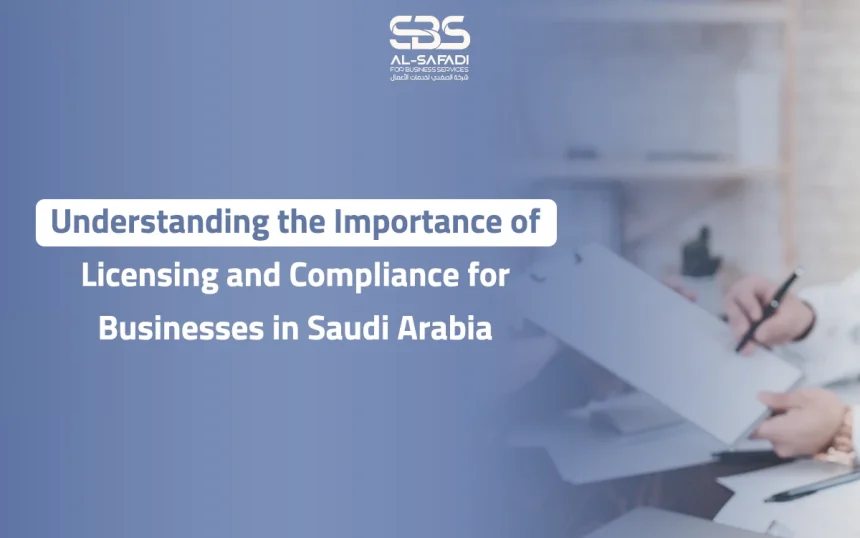
Understanding the Importance of Licensing and Compliance for Businesses in Saudi Arabia5
Introduction:
Saudi Arabia, as the largest economy in the Middle East, is a hub for foreign investments, innovation, and commercial activities. As part of its Vision 2030 reforms, the Kingdom has become increasingly welcoming to international businesses seeking to expand their operations into the region. However, understanding the importance of licensing and compliance is vital for businesses that plan to operate in Saudi Arabia. The regulatory environment is designed to ensure that foreign companies adhere to local laws, maintain ethical business practices, and contribute to the sustainable growth of the Kingdom’s economy.
In this article, we will explore the essential aspects of business licensing and compliance in Saudi Arabia, focusing on why it is crucial for foreign investors and businesses to understand and follow the legal requirements.
1. Legal and Regulatory Framework for Business Licensing in Saudi Arabia
Saudi Arabia has developed a robust legal framework for business licensing, which is primarily managed by various government entities, including the Saudi Arabian General Investment Authority (SAGIA), the Ministry of Commerce and Investment (MCI), and the Ministry of Labor and Social Development (MLSD). For businesses seeking to operate in Saudi Arabia, complying with the licensing regulations is one of the first critical steps.
Key Licensing Entities and Their Roles:
- SAGIA: The Saudi Arabian General Investment Authority is responsible for issuing investment licenses to foreign businesses that wish to set up operations in Saudi Arabia. It helps facilitate the process of obtaining the necessary permits and approvals for foreign investors.
- MCI: The Ministry of Commerce and Investment regulates the establishment and operation of businesses within Saudi Arabia. This includes registering companies, issuing commercial registrations (CR), and ensuring compliance with business laws.
- MLSD: For companies hiring employees in Saudi Arabia, the Ministry of Labor and Social Development ensures compliance with Saudi labor laws, such as Saudization, which mandates the employment of Saudi nationals in certain sectors.
Why Licensing and Compliance Matter:
- Legality: Having the proper licenses ensures that your business is recognized legally within Saudi Arabia, preventing legal issues or penalties.
- Business Credibility: A licensed business enhances its credibility in the eyes of clients, partners, and investors.
- Regulatory Support: Licensing allows businesses to benefit from the support and incentives offered by the Saudi government, especially under initiatives like Vision 2030.
2. Types of Business Licenses in Saudi Arabia
The type of license a company needs in Saudi Arabia will depend on its business activities, legal structure, and whether it is a foreign or local entity. Below are some of the common types of business licenses for foreign businesses operating in Saudi Arabia:
Types of Business Licenses:
- Investment License: This is the primary license required by foreign businesses wishing to invest in Saudi Arabia. Obtained through SAGIA, this license grants foreign investors permission to establish a business in the Kingdom.
- Commercial Registration (CR): This is a mandatory requirement for all businesses in Saudi Arabia. A CR is issued by the Ministry of Commerce and Investment and serves as the official recognition of the company’s legal status.
- Specialized Licenses: Depending on the industry, certain businesses may require specialized licenses. For example, businesses in the healthcare, education, and financial sectors must obtain additional approvals and licenses from relevant regulatory bodies.
- Franchise License: For businesses wishing to operate a franchise in Saudi Arabia, a specific franchise license is required. This license ensures that the business is in compliance with local regulations regarding franchising.
Why It Works:
- Clear Business Pathway: Different business licenses provide clear pathways for companies to operate legally and expand in the Kingdom.
- Sector-Specific Regulations: By obtaining the correct license, companies ensure that they meet the specific requirements for their industry, whether it’s health, finance, or technology.
3. Compliance with Saudi Regulations: Labor Laws and Saudization
One of the key regulatory requirements for businesses in Saudi Arabia is adherence to labor laws, particularly the Saudization initiative. Saudization is a government program aimed at increasing the employment of Saudi nationals in the private sector. Non-compliance with Saudization can result in penalties and restrictions.
Key Compliance Areas:
- Saudization: Foreign companies operating in Saudi Arabia must employ a certain percentage of Saudi nationals based on their industry and business size. This is particularly important for sectors like retail, hospitality, and telecommunications.
- Employment Contracts: All employees, both local and foreign, must have written employment contracts in accordance with Saudi labor laws. These contracts should outline terms and conditions, including work hours, wages, and benefits.
- Work Visas: Foreign employees must obtain work visas sponsored by their employer. The employer is responsible for ensuring that these visas are valid and up to date.
Why It Works:
- Government Compliance: Adhering to labor laws and Saudization regulations ensures that your business operates in line with government expectations and avoids penalties.
- Local Workforce Integration: Embracing Saudization helps integrate the local workforce into your business, contributing to long-term sustainability.
4. Taxation and Financial Compliance
In Saudi Arabia, businesses are subject to a variety of tax obligations, including corporate tax, value-added tax (VAT), and Zakat (an Islamic form of wealth tax). Compliance with tax laws is crucial for foreign businesses to avoid hefty fines or legal trouble.
Key Tax Considerations:
- Corporate Tax: Saudi Arabia imposes a corporate tax rate of 20% on foreign-owned companies. However, certain industries, such as oil and gas, may face different rates.
- Zakat: Companies operating in Saudi Arabia are also required to pay Zakat, which is calculated based on the company’s assets.
- VAT: Saudi Arabia implemented a VAT system at a rate of 15% in 2020. This tax applies to most goods and services and requires businesses to collect and remit VAT to the government.
- Tax Filing: Companies must file tax returns annually and comply with the reporting requirements set by the Saudi General Authority of Zakat and Tax (GAZT).
Why It Works:
- Financial Integrity: Compliance with tax laws ensures that your company maintains financial integrity and avoids fines or audits.
- Long-Term Sustainability: Adhering to financial compliance helps ensure that your business operates smoothly, contributing to long-term success in the Saudi market.
5. Why Licensing and Compliance is Essential for Foreign Investors
For foreign investors, understanding and complying with Saudi Arabia’s licensing and regulatory requirements is essential for avoiding legal hurdles and ensuring smooth operations. The Kingdom has been actively working to create a business-friendly environment for foreign investors, but this requires adherence to local laws.
Benefits for Foreign Investors:
- Faster Market Entry: Obtaining the necessary licenses allows foreign companies to enter the Saudi market quickly and legally.
- Government Incentives: Compliance with regulations may qualify businesses for government incentives, tax breaks, or support under Vision 2030.
- Protection from Legal Risks: Ensuring compliance minimizes the risk of fines, penalties, or legal issues that could disrupt business operations.
Conclusion
Navigating the licensing and compliance landscape in Saudi Arabia is essential for foreign businesses aiming to operate in the Kingdom. By understanding the regulatory requirements, obtaining the necessary licenses, and adhering to labor and tax laws, businesses can establish a strong foothold in Saudi Arabia’s thriving economy. With the government’s commitment to fostering foreign investment, businesses that follow the legal framework will be well-positioned for success in one of the most dynamic markets in the Middle East.
Sources:
- Saudi Arabian General Investment Authority (SAGIA): www.sagia.gov.sa
- Ministry of Commerce and Investment (MCI): www.mci.gov.sa
- Ministry of Labor and Social Development: www.mlsd.gov.sa
- General Authority for Zakat and Tax (GAZT): www.gazt.gov.sa
